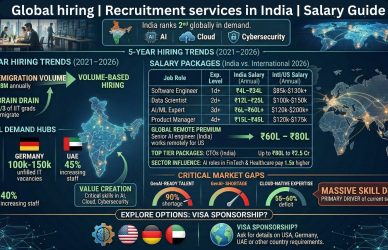Introduction: The Appeal of the Indian Market for US Companies
Growing Interest in the Indian Market
India has emerged as a prominent destination for US companies seeking expansion opportunities. With its large consumer base, rapid technological growth, and skilled workforce, India presents an attractive market for companies across various industries. US firms are increasingly interested in tapping into India’s growth potential, recognizing it as a key player in the global economy.
Navigating Complex Local Employment Laws
While the prospects are promising, establishing a presence in India comes with its own set of challenges. One of the major hurdles for US companies is India’s complex employment landscape. Navigating local employment laws, compliance standards, and tax regulations can be overwhelming. Furthermore, cultural differences and unique labor laws often require specialized knowledge, making it difficult for foreign companies to operate smoothly.
How PEO Services Address Key Challenges
Professional Employer Organizations (PEO) offer a practical solution for US companies venturing into India. PEOs manage various HR functions, including employee recruitment, payroll processing, and compliance with local regulations, enabling businesses to focus on their core operations. By partnering with a PEO, US companies can reduce administrative burdens, streamline operations, and ensure compliance with Indian employment laws, providing a pathway for smoother and more efficient market entry. This article explores how PEO services can support US firms in capitalizing on the Indian market’s potential while mitigating operational challenges.

Understanding PEO Services: What US Companies Need to Know
What is a Professional Employer Organization (PEO)?
A Professional Employer Organization (PEO) is a company that partners with businesses to handle essential human resources (HR) functions, typically through a co-employment arrangement. This arrangement allows the PEO to manage a wide array of HR tasks on behalf of the client company, such as payroll processing, compliance, and benefits administration. For US companies expanding into markets like India, where HR regulations and practices differ significantly from those in the US, PEOs provide expertise and resources that help navigate these complexities efficiently. This support enables businesses to establish a presence in India without the need to set up a legal entity, which saves time, resources, and capital.
Core Functions of PEO Services
PEO services encompass a variety of core functions that can streamline HR operations for US companies:
Payroll Processing: PEOs handle payroll processing to ensure timely and accurate salary disbursement. They manage local tax withholdings, statutory deductions, and salary compliance with Indian labor laws. This alleviates the burden on US companies unfamiliar with India’s payroll requirements.
Human Resources Management: From recruitment and onboarding to performance management and employee relations, PEOs provide comprehensive HR support. They help align HR practices with the expectations and needs of the local workforce, ensuring cultural adaptability and smooth integration.
Compliance with Local Regulations: India’s employment laws are intricate and vary across states. PEOs are well-versed in the compliance requirements around labor laws, tax regulations, social security, and employment contracts. They keep up with legislative changes, minimizing the risk of non-compliance and potential penalties for US companies.
Employee Benefits Administration: PEOs manage employee benefits, including health insurance, retirement plans, and other statutory and supplemental benefits that align with Indian labor laws. This helps US companies offer competitive packages to attract and retain talent, without having to navigate complex benefit structures.
Why PEO Services are Beneficial for US Companies in India
For US companies entering the Indian market, PEO services are invaluable for reducing operational burdens. A PEO partner not only simplifies the administrative aspects of expansion but also provides localized expertise crucial for compliance and cultural adaptation. By managing HR complexities, a PEO allows US companies to focus on core business activities and growth strategies rather than navigating local bureaucracies and compliance. This service model also offers scalability, enabling companies to expand their workforce with minimal logistical challenges, making PEOs an ideal solution for US companies aiming to establish or grow a foothold in India’s dynamic market.

The Role of PEOs in Simplifying HR Compliance in India
India’s Complex Labor and Employment Laws
India’s labor and employment laws are extensive, covering everything from wages and work hours to benefits, employee rights, and workplace safety. These regulations vary across states, making compliance challenging for foreign companies unfamiliar with the country’s legal landscape. Key aspects include:
Tax Regulations: India has a multi-layered tax system involving federal and state taxes. Employers must withhold income tax (TDS) from employee salaries and contribute to Provident Fund (PF), Employee State Insurance (ESI), and other statutory schemes, depending on the nature of the business and the employee’s salary bracket. Non-compliance can result in significant penalties and impact the company’s reputation.
Employment Contracts: Employment agreements in India must clearly outline the terms of employment, role, and responsibilities. Unlike in the US, fixed-term employment contracts are common, but they must adhere to labor standards. Additionally, termination policies are tightly regulated, often requiring advance notice and severance packages depending on the employee’s tenure and job role.
Labor Laws and Worker Rights: Labor laws in India protect various worker rights, including those related to work hours, overtime pay, leave entitlements, and workplace safety. India’s Minimum Wages Act, Factories Act, and Shops and Establishments Act all impose specific requirements that vary by state, creating a complex framework for HR management.
How PEO Services Help Companies Adhere to Regulations
Professional Employer Organizations (PEOs) offer essential support by handling HR compliance on behalf of companies. They ensure that businesses meet the requirements of India’s complex regulatory environment while reducing administrative burdens. Here’s how PEOs play a key role in simplifying HR compliance:
Navigating Tax Compliance: PEOs take on the responsibility of handling payroll taxes, statutory contributions, and income tax deductions. They are up-to-date with local tax laws, ensuring that deductions are accurate and timely. This relieves foreign companies from the risk of underpayment or delayed filings, which could result in financial penalties.
Drafting Compliant Employment Contracts: PEOs help draft and review employment contracts to align with local standards. They structure terms to comply with Indian labor laws, ensuring that contracts are legally binding and protect both the employer and employee. PEOs also advise on contract terms for termination, severance, and notice periods, helping companies avoid potential disputes.
Ensuring Adherence to Labor Standards: PEOs handle workforce-related compliance, including overtime calculations, adherence to minimum wage standards, and leave policies. They keep track of state-specific regulations, ensuring that each employee’s rights are respected in line with Indian laws. This is particularly beneficial for US companies unfamiliar with these standards, as it reduces the risk of violations.
Real-World Scenarios Where PEOs Prevent Compliance-Related Issues
PEOs play a preventive role in compliance management, helping companies avoid costly and reputation-damaging issues. Here are a few scenarios where PEOs provide critical support:
Managing Taxation for a Growing Workforce: A US tech company expanding its team in India could struggle with the diverse tax requirements across states. A PEO ensures that income tax, Provident Fund, and other contributions are accurately calculated and timely filed, reducing the risk of non-compliance and late fees.
Navigating Termination Disputes: If a US company needs to terminate an employee for performance issues, the process must comply with India’s termination policies, which include advance notice and severance for certain roles. A PEO guides the company through the required procedures, helping to avoid legal disputes or penalties that could arise from improper termination practices.
Adapting to Labor Law Changes: Labor laws in India can change frequently, adding complexity to workforce management. For instance, recent updates to the Code on Wages and other labor reforms require companies to adapt policies around minimum wage and overtime. A PEO continuously monitors these changes, ensuring the company’s policies stay aligned with current regulations.
Through their comprehensive approach to HR compliance, PEOs serve as a reliable partner for US companies, enabling them to operate confidently in India’s complex regulatory landscape. By managing these compliance-related aspects, PEOs reduce operational risks, protect companies from legal liabilities, and create a smoother pathway to successful business expansion in India.

Key Benefits of Using PEO Services for US Companies
Cost Efficiency: Lower Operational Costs
Using PEO services allows US companies to significantly reduce operational costs when expanding into India. Setting up a full HR department in a foreign country requires substantial investment, including office space, hiring, and administrative expenses. A PEO takes on the responsibility for these HR functions, which eliminates the need for additional infrastructure and lowers overhead costs. Additionally, PEOs have established processes and economies of scale, enabling them to deliver HR services at a fraction of what it would cost for companies to manage these functions independently.
Focus on Core Business
When expanding into a new market, US companies need to concentrate on growth and market penetration rather than getting bogged down by administrative tasks. PEOs manage HR responsibilities like payroll, benefits administration, compliance, and recruitment, freeing companies to focus on strategic objectives. By outsourcing these routine tasks, leadership and teams can dedicate more time and resources to business development, customer acquisition, and competitive positioning in the Indian market. This enhanced focus allows companies to build their brand, strengthen their presence, and achieve growth more rapidly.
Risk Management: Reduced Liability and Compliance Assurance
One of the biggest challenges for foreign companies entering India is navigating the country’s complex and evolving labor laws. Non-compliance with these regulations can lead to costly penalties and damage a company’s reputation. PEOs, however, are well-versed in local compliance requirements and have the expertise to handle the intricacies of Indian labor laws. They ensure that companies adhere to legal standards related to payroll, taxes, employment contracts, and employee benefits, effectively reducing liability and the risk of legal disputes. By relying on PEOs to handle compliance, US companies can operate with greater confidence and reduced risk in the Indian market.
Access to Local Talent: Efficient Recruitment and Onboarding
PEOs provide US companies with access to India’s diverse talent pool, leveraging their local market knowledge and networks to recruit the right candidates efficiently. PEOs understand cultural nuances, compensation expectations, and the most effective recruitment channels, ensuring that companies attract skilled professionals who align with their goals. Furthermore, PEOs manage onboarding processes that adhere to local employment standards, helping new hires integrate smoothly into the organization. This access to local talent enables US companies to build capable teams without the challenges of navigating the unfamiliar Indian job market independently.
By partnering with a PEO, US companies entering India gain a strategic advantage through cost savings, operational focus, compliance expertise, and streamlined access to talent. These benefits provide a solid foundation for successful expansion, empowering companies to operate effectively in India’s dynamic business landscape.

Overcoming Cultural and Language Barriers with PEO Support
Bridging Cultural and Language Gaps
When US companies expand into India, one of the common challenges is navigating cultural and language differences that may impact day-to-day operations. Professional Employer Organizations (PEOs) play a crucial role in bridging these gaps by acting as cultural intermediaries who understand both US and Indian business practices. PEOs are familiar with the local culture and languages, which allows them to facilitate effective communication between US and Indian teams. They can provide guidance on culturally sensitive matters and advise on communication styles that resonate with local employees, ensuring smoother interactions and minimizing misunderstandings.
Fostering a Smooth Work Environment with Local Insights
PEOs leverage their deep knowledge of the Indian workplace culture to help create a harmonious work environment for US companies. They educate US teams on workplace norms, hierarchy expectations, and respectful communication practices that are valued in India. For example, the importance of respect for seniority and consensus-driven decision-making are often emphasized in Indian corporate culture. PEOs help companies adapt to these expectations, reducing friction between local and international teams. Additionally, PEOs assist with managing holidays, festivals, and cultural events, ensuring that Indian employees feel recognized and valued within the organization. This attention to cultural nuances fosters inclusivity and enhances employee satisfaction, leading to better morale and productivity.
Examples of Cultural Nuances Impacting Business Success
Understanding cultural nuances can make a significant difference in business outcomes. For instance, in India, professional relationships are often built on trust and familiarity. PEOs encourage US companies to adopt relationship-building practices, such as regular check-ins and team-building activities, which can strengthen ties between the local team and their US counterparts. Another example is the emphasis on indirect communication in India, where feedback may be given subtly rather than directly. PEOs help US managers interpret such communication and adapt their leadership style to one that is more culturally sensitive, avoiding potential misinterpretations.
Furthermore, language differences can impact productivity, especially if employees are uncomfortable communicating in English. PEOs can arrange for bilingual HR support or language training if needed, making sure that all employees feel comfortable and confident in their roles. By fostering open, culturally attuned communication, PEOs enable smoother workflows and create a cohesive, respectful environment.
With PEO support, US companies can overcome cultural and language barriers effectively, allowing them to build stronger relationships with their Indian teams. This cultural adaptability not only improves collaboration but also positively impacts long-term business success in the Indian market.

Comparing PEO Services to Other Expansion Models (EOR, Direct Hiring, Subsidiary)
Overview of Expansion Models: EOR, Direct Hiring, and Subsidiaries
When US companies look to expand into India, they typically consider several expansion models, each with its own benefits and complexities:
Employer of Record (EOR): An EOR serves as the official employer for tax and legal purposes, managing payroll, compliance, and benefits on behalf of the company. EORs are useful for companies wanting a hands-off approach to employment in a foreign country without setting up a legal entity. However, EORs may not offer as much HR flexibility as PEOs in terms of workforce management and cultural integration.
Direct Hiring: With direct hiring, the company recruits and employs staff in the foreign market without an intermediary. This approach offers complete control over HR but comes with substantial administrative burdens, including navigating local employment laws, setting up payroll, and ensuring regulatory compliance. Direct hiring requires a deep understanding of the market and can be challenging for foreign companies new to Indian employment practices.
Establishing a Subsidiary: Setting up a legal subsidiary in India offers companies full control and presence in the local market. However, creating a subsidiary is a time-consuming and costly process involving regulatory compliance, significant capital investment, and an extensive administrative framework. Subsidiaries work best for long-term commitments rather than initial market entry.
Advantages of PEO Services Over Other Models
PEO services provide unique benefits that differentiate them from EOR, direct hiring, and subsidiary models:
Simplified Market Entry: Unlike subsidiaries, which require months to establish, PEOs allow for quick market entry by managing HR and compliance from day one. US companies can start operations without the need for a legal entity, saving both time and costs.
Operational Efficiency: Compared to direct hiring, where companies must handle all aspects of employment law and HR management independently, PEOs manage payroll, compliance, benefits, and even employee onboarding. This level of support reduces the administrative burden on the US company, allowing it to focus on core business operations.
Enhanced Flexibility: PEOs provide more flexibility than EORs by allowing the client company more involvement in day-to-day HR processes, from recruitment to performance management. This flexibility is crucial for companies that want to build a cohesive team and adapt HR practices based on cultural insights, rather than simply outsourcing employment.
Cost-Effective: Establishing a subsidiary can be costly, and direct hiring involves substantial operational expenses for HR and compliance. In contrast, PEOs offer cost efficiency by handling these services at a fraction of the expense, making it an ideal solution for companies with budget constraints or those testing the Indian market.
Why PEO is a Flexible and Cost-Effective Option for US Businesses
For US companies entering India, PEO services combine flexibility, efficiency, and cost-effectiveness, making them an ideal expansion model. PEOs provide the expertise to navigate India’s complex employment laws and handle administrative tasks, allowing companies to focus on growth. This model also supports scalability, enabling companies to expand or adjust their workforce as needed without long-term commitment to a legal structure. For businesses exploring market potential in India, PEOs offer the optimal blend of speed, compliance, and local expertise, making it a highly attractive entry strategy.

The Process of Partnering with a PEO in India
Step 1: Selecting the Right PEO
Partnering with a Professional Employer Organization (PEO) in India begins with choosing the right provider. Start by identifying PEOs with experience in your industry and familiarity with India’s regulatory environment. Evaluate the range of services they offer, such as payroll processing, benefits administration, compliance, and recruitment. Look for PEOs that provide comprehensive support tailored to your needs, allowing you to streamline HR operations without sacrificing flexibility.
Step 2: Conducting Due Diligence
Due diligence is crucial when selecting a PEO to ensure you partner with a reputable and reliable organization. Key aspects to assess include:
Experience and Track Record: Review the PEO’s years in operation, their expertise in handling international clients, and client testimonials or case studies. A well-established PEO with experience in India’s labor market is more likely to navigate complex regulations and mitigate risks effectively.
Service Scope: Confirm that the PEO provides the specific HR functions your business requires, such as compliance management, employee benefits, and recruitment. This alignment will prevent gaps in support and ensure smoother operations.
Compliance and Certifications: Verify that the PEO complies with Indian labor laws and has the necessary certifications. This includes adherence to data protection standards and experience with Indian statutory requirements, ensuring your company avoids legal or compliance issues.
Step 3: Onboarding and Integration
Once a PEO is selected, the onboarding process begins. During onboarding, the PEO integrates your company’s workforce into their system, managing payroll setup, benefits enrollment, and compliance documentation. This phase also includes educating your team on PEO protocols, aligning HR practices, and setting clear lines of communication. A smooth onboarding process helps the PEO gain insight into your organizational culture and values, fostering a collaborative partnership that supports your goals in the Indian market.
Pitfalls to Avoid When Selecting a PEO
While partnering with a PEO can offer many advantages, there are potential pitfalls to avoid:
Overlooking Local Expertise: Some PEOs may lack in-depth knowledge of specific regional regulations within India. Ensure that your chosen PEO has expertise in the specific states or regions where you plan to operate.
Ignoring Service Level Agreements (SLAs): Clearly outline expectations and performance metrics in a Service Level Agreement (SLA). This will help manage service quality and ensure both parties are aligned on deliverables.
Underestimating Data Security Needs: Ensure the PEO has strong data protection policies to safeguard employee information, especially in regions with stringent data privacy laws.
By following these steps and conducting thorough due diligence, US companies can successfully partner with a PEO in India, enabling a seamless and compliant entry into the market.

Challenges and Considerations for US Companies Using PEO Services in India
Navigating Indian Employment Laws and Business Customs
One of the primary challenges for US companies using PEO services in India is understanding and adapting to the country’s complex employment laws and unique business customs. Indian labor laws cover a wide range of areas, including wages, working hours, contract terms, and social security. These laws can vary by state, adding another layer of complexity for companies unfamiliar with the region. Additionally, Indian business customs, such as the importance of hierarchy and respect for seniority, may differ significantly from US practices. Without a nuanced understanding of these customs, companies risk missteps that could affect employee satisfaction and productivity.
Risks of Data Security and PEO Dependency
Data security is a crucial consideration for US companies working with PEOs in India, as employee data and sensitive information are often shared with the PEO for payroll, compliance, and HR management purposes. Inadequate data protection could expose companies to breaches or misuse of confidential information, especially if the PEO lacks stringent data security measures. Furthermore, companies may become highly dependent on their PEO for core HR functions, which could create challenges if the PEO’s services do not meet expectations or if there are disruptions in the partnership. Excessive reliance on a PEO can also make it difficult to transition to in-house operations should the company later decide to manage HR independently.
Tips for Addressing Challenges and Mitigating Risks
To successfully navigate these challenges, US companies can take proactive steps to protect their interests and ensure a smooth partnership with their PEO:
Conduct Regular Compliance Checks: Even with a PEO managing HR compliance, it’s essential for companies to conduct regular audits and reviews of their compliance practices. By staying updated on regulatory changes and confirming that the PEO is adhering to local laws, companies can mitigate the risk of unintentional non-compliance.
Establish Data Security Protocols: Ensure that the PEO has strong data protection policies aligned with both Indian and international standards. Companies should establish data-sharing protocols, limit access to sensitive information, and confirm that the PEO employs robust cybersecurity measures to safeguard employee data.
Maintain Close Communication: Building a strong relationship with the PEO is essential for a successful partnership. Regular check-ins, clear communication channels, and periodic performance evaluations can help align the PEO’s services with the company’s evolving needs and ensure expectations are consistently met. This level of communication also facilitates faster resolution of any issues that arise and helps avoid misunderstandings due to cultural or operational differences.
Prepare for Potential Transition: While partnering with a PEO offers flexibility, it’s wise to have contingency plans in place in case the company decides to internalize HR functions or switch PEO providers. Maintaining some in-house HR expertise can make any potential transition smoother and prevent service disruptions.
By addressing these challenges proactively, US companies can create a more resilient and effective partnership with their PEO in India, fostering compliance, data security, and operational continuity.

Case Studies: Successful US Companies Leveraging PEO Services in India
Case Study 1: Tech Startup Streamlines Entry with Cost Savings and Compliance Support
A US-based tech startup, eager to tap into India’s skilled IT workforce, partnered with a PEO to expand its operations without establishing a legal entity. By leveraging the PEO’s recruitment and onboarding services, the startup quickly hired a team of software developers and IT specialists, bypassing the complexities of local compliance. The PEO managed payroll, tax contributions, and statutory benefits, allowing the startup to operate efficiently within Indian labor laws. As a result, the company saved significantly on administrative and legal costs, enabling it to allocate more resources toward product development and marketing. The PEO’s support in navigating local regulations was crucial in maintaining compliance, helping the startup avoid potential penalties and reputational risks.
Case Study 2: Manufacturing Firm Enhances Scalability and Efficient Onboarding
A mid-sized US manufacturing company, seeking to explore supply chain opportunities in India, used PEO services to set up a small team focused on procurement and logistics. Through the PEO, the company efficiently onboarded local talent with knowledge of Indian suppliers and customs procedures. The PEO’s deep understanding of Indian business customs helped the firm build strong supplier relationships and streamline its operations in the new market. Additionally, the company could easily scale its team as needed without the logistical hurdles of establishing a legal subsidiary. This flexibility allowed the company to test the Indian market and adjust its workforce size without a long-term commitment, maximizing operational agility.
Case Study 3: Financial Services Firm Gains Market Insights and Operational Continuity
A US-based financial services firm sought to expand its back-office operations in India to support global operations. Partnering with a PEO allowed the firm to quickly hire finance professionals while maintaining strict data security and regulatory compliance. The PEO facilitated secure data-sharing practices and managed compliance with India’s stringent employment laws, minimizing the company’s exposure to legal risks. This partnership also provided the firm with insights into the local job market, enabling it to offer competitive compensation and benefits to attract top talent. The firm realized significant cost savings by not setting up a full legal entity and gained a strategic advantage by establishing a local team with minimal administrative hassle.
Benefits Realized Through PEO Partnerships
In each of these cases, PEO services helped US companies navigate India’s regulatory landscape, streamline recruitment and onboarding, and reduce operational costs. By managing compliance and HR functions, the PEOs enabled these companies to expand into India effectively without setting up full entities, providing a low-risk and cost-effective pathway to market entry. These examples underscore how PEOs can support companies in achieving scalability, flexibility, and efficiency in the Indian market.

Future of PEO Services in India: Trends to Watch for US Companies
Integration of AI in HR Services
As AI technology advances, PEOs in India are increasingly adopting AI-driven tools for recruitment, employee engagement, and performance management. AI can streamline candidate screening, predict employee turnover, and personalize training programs, making HR functions more efficient and data-driven. For US companies partnering with PEOs, this shift means access to innovative, AI-powered HR solutions that can enhance workforce management and reduce hiring time, helping businesses scale faster in India’s competitive talent market.
Increased Regulatory Scrutiny
With evolving labor laws and heightened focus on employee rights, India’s regulatory environment is becoming more stringent. Authorities are introducing reforms in areas like wage codes, social security, and data protection, necessitating compliance adaptations for companies. PEOs play a vital role in ensuring compliance with these regulations, offering US companies a buffer against legal risks. As regulatory scrutiny intensifies, US firms can rely on PEOs to navigate changes efficiently, ensuring smooth operations without unexpected legal challenges.
Growing Popularity of PEO Partnerships
The increasing demand for flexible, scalable HR solutions is driving the popularity of PEO partnerships in India, especially among foreign companies. PEOs offer the advantages of rapid market entry, reduced costs, and expert compliance support, which are particularly valuable for US companies exploring India’s dynamic market. This trend is expected to grow as more businesses recognize the strategic value of PEOs in navigating the complexities of foreign expansion. For US companies, a trusted PEO partnership offers a responsive, future-ready approach to managing HR, compliance, and workforce growth in India.

Conclusion: Why PEO Services Are the Optimal Choice for US Expansion in India
Summary of PEO Advantages
PEO services offer US companies a powerful solution for expanding into India by addressing the challenges of navigating a new market’s complex regulatory environment and cultural landscape. Through PEO partnerships, businesses gain access to critical HR functions such as payroll, recruitment, and compliance management without the need to set up a costly legal entity. This streamlined approach not only reduces operational costs but also allows companies to focus on their core activities, enhancing overall efficiency and productivity.
Benefits of Cost Efficiency, Simplified HR, and Compliance Support
The cost efficiency achieved through PEO services is a significant advantage, especially for companies testing India’s market potential. With reduced HR overhead and lower administrative burdens, PEOs provide a financially sustainable expansion model. Furthermore, their expertise in Indian labor laws and HR practices ensures that US companies can operate confidently within compliance, avoiding potential legal risks and penalties. This simplification of HR processes frees up resources, enabling leadership teams to prioritize strategic growth initiatives.
The Evolving Role of PEOs in Global Expansion
As the international business landscape grows increasingly interconnected, PEOs are becoming indispensable partners for companies entering foreign markets. With emerging trends in AI-driven HR and heightened regulatory demands, PEOs continue to adapt, offering innovative solutions that enhance workforce management. For US companies eyeing the Indian market, PEOs represent not only a practical entry strategy but also a forward-looking approach to global expansion, paving the way for sustainable growth in India and beyond.




